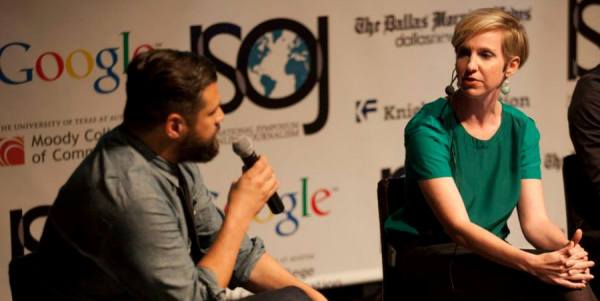
By Elizabeth McGuire
Emily Ramshaw admits she is more comfortable on the other side of the interview. As a seasoned reporter and current editor of The Texas Tribune, she is typically the one asking questions. But she made an exception for Leadership Austin and gave us a glimpse into her world, which is full of politicians and pit bulls (and we assume the occasional pit-bull politician).
Poised and friendly, Ramshaw lights up when talking about her job and her life in Austin. Her energy is infectious. She started as a reporter at The Texas Tribune and as editor for the past three years, Ramshaw has helped to steer a groundbreaking publication into a valuable resource on Texas politics.
Originally from Washington DC, Ramshaw has embraced all things Austin and says she has never felt more at home than here. She serves the community through Meals on Wheels and on the boards of the Freedom of Information Foundation of Texas and the American Society of News Editors.
Ramshaw is the recipient of Leadership Austin’s 2015 Ascendant Award, and will be honored at the 2015 Best Party Ever presented by H-E-B on May 8.
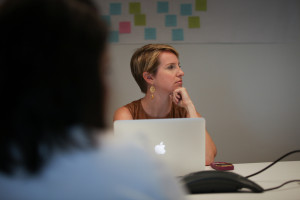 You’ve been a journalist your whole career. What drew you to journalism?
You’ve been a journalist your whole career. What drew you to journalism?
My parents are both political journalists and I was raised on Capitol Hill in DC. They were both really in love with their careers and it was fun to be raised by people who absolutely adored what they were doing. From the very beginning I was a high school newspaper editor, went to journalism school for college and got hired by the Dallas Morning News after college.
I had no idea in a million years that I would ever live in Texas. It seemed like a completely foreign country to me at the time. I spent 7 great years working for the Dallas Morning News and I was lucky enough for them to transfer me to Austin to cover the Legislature…and that’s really when I fell in love with Texas.
You see so many people who dial it in, and a job is just a job. For me it’s crucial to who I am and how I understand communities and the people around me. I look forward to being in the office every single day. I work with an incredible crew of smart, hard-charging, inquisitive people. You never stop learning. You have to become a mini-expert at all these different topics.
Can you describe for readers how The Texas Tribune is different than other publications?
We are different than a traditional news organization largely because of how we are funded. We are a nonprofit venture. We believe very strongly that journalism is a public service. We seek corporate underwriting (advertising), individual donors, major gifts, and grants from foundations to do interesting types of journalism. We also have a very robust events business where we bring in a lot of revenue as well. For us, it’s trying to find a sustainable path of making sure that political and public policy journalism in Texas continues to be very robust for the foreseeable future. We are five years old, so we’ve moved to the toddler stage from our infancy.
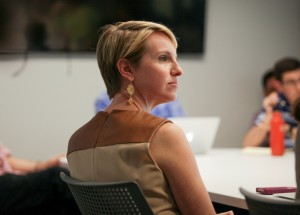 As a political journalist you work with many different personalities and perspectives. Did that ability come naturally to you or was it a learned skill?
As a political journalist you work with many different personalities and perspectives. Did that ability come naturally to you or was it a learned skill?
It’s particularly a learned skill in Austin because you’re in this fascinating community where you are surrounded by the left of the left…but if you cover the capitol, you are immersed in the right of the right. So it really makes you think outside your comfort zone. It makes you dig deep to understand where people of different backgrounds are coming from. Austin is in some ways a microcosm of the rest of the country because you have a huge clash here, right in front of you.
You really have to stretch to make sure you’re being inclusive of the viewpoints of this entire state, not just the people who are here in Austin.
Any pointers for helping people hear both sides?
I really try to go to the core of why people believe what they believe. Sometimes it’s just politics, and certain battles are just about winning or losing. Then there are other circumstances where if you look at where people are from, and you look at their family backgrounds, and you look at the different motivators in their lives…you understand, you empathize, you start to get it. It’s not black and white…and too many people look at politics as “they’re wrong, I’m right.” There are so many gray areas, so many nuances, and you can find that among the hundreds of people who make up the Texas Legislature.
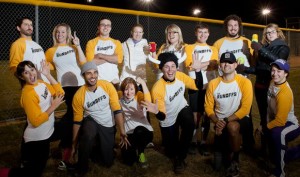 What drives you in your career?
What drives you in your career?
I’m driven by a desire to ensure that journalism exists for generations and generations to come. In my early days as a journalist I watched lots of my mentors lose their jobs because journalism was not a sustainable enterprise for many of those organizations. I want to make sure that the people who work for me never know what it’s like to think their job is at risk because of the funding mechanism of their organization. I want them to focus day in and day out on breaking and telling kick-ass stories. I don’t want them worrying whether their job is in jeopardy.
So a lot of what I spend time thinking about is how we can build a product and business model that are so solid that the risk doesn’t exist. That the only risk we take is, for example, going out to west Texas to tell a story about communities in 2015 that still don’t have access to clean drinking water.
You joined the Essential Class of 2013. What drew you to Leadership Austin?
I feel deeply engaged on the state level, and I know a lot about state politics and state policy. I didn’t feel nearly as connected to my immediate community, and I wanted to. I wanted to have the macro and the micro. I knew there were a lot of things I could learn about my immediate community by spending a year really focusing on those local issues.
I can’t get involved in local politics. I’m a journalist: I cover it. So this was a safe way to explore a lot of local issues without it seeming political. Really it was educational for me.
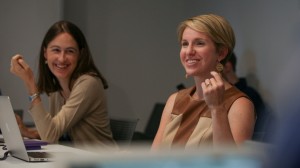 What experiences from Leadership Austin have stuck with you?
What experiences from Leadership Austin have stuck with you?
In Austin, I hadn’t had as much interaction with–this sounds so naive–but people of different backgrounds. My whole universe had been among politicians and journalists. Meeting people from this wide range of backgrounds: different socio-economic backgrounds, different ethnic backgrounds, people from all different parts of the state who had found their way to Austin for varying reasons. I felt like there were a lot of shared goals and shared visions.
I also learned how committed I feel to ensuring that Austin is a special, hospitable and thriving place for people for years to come. I feel a strange brand loyalty to Austin. I came here by way of Dallas. I was raised in DC and went to school in Chicago…but I didn’t know what home felt like until I moved to Austin. I very quickly believed that this was the place where I was meant to be and these were the people I was meant to be with. Leadership Austin only solidified that. I was surrounded by people who were magnificent, brilliant and so driven and committed. The program really solidified my love of Austin and my desire to be a part of what makes this city hum.
What did you think when Leadership Austin called about the Ascendent Award?
I was so shocked my hair all stood on end. I was so flattered. So many people who went through the Essential program are just incredible. I look at them and think, “How did I even get in?” I hope that I can continue to be a good representative for this organization because it has meant a great deal to me as a relatively new resident of Austin.
How would you describe your leadership style?
I perform a lot of triage, particularly in breaking news situations. I thrive in moments when news is exploding and someone needs to be in charge and decide how we proceed. The rest of the time, I try to be the kind of leader who leads through listening. I have an extraordinary team of people who I trust and would go to the ends of the earth for (and I know they would do the same for me). Part of being a great leader is building the best possible team you can, so you don’t have to always be the one leading.
Any advice for emerging leaders?
Don’t be afraid to take risks. That sounds cliché but I would not have become a leader if I hadn’t taken a leap from traditional media to this brand-new baby start-up.
I was going to be a reporter here and I saw a leadership opportunity. I saw a void and a place I thought I could contribute. And I didn’t wait for someone to hand it to me. I grabbed it. Too many women wait to be told “It’s your time.” I became editor here when I had just turned 30 years old and if I had waited for someone to tell me it’s my time, it might have been a decade or two. My best advice: If you see an opportunity for yourself to rise to the top, to contribute, to run the organization, or to run a department, don’t wait for someone to tell you it’s the right time. Make it your time.
What about more experienced leaders?
You’re never the leader that you want to be. I think it’s really important to step back and make sure you have people you trust to give honest feedback on your own leadership ability. I never want to stop getting constructive feedback from the people I work with about how I can be a better leader. I’m evolving. I haven’t done this for that long. A lot of leaders don’t spend enough time seeking out that kind of feedback. It’s really important to me to make sure I get better at this.
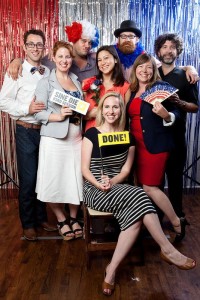 What do you think Austin needs right now as a community?
What do you think Austin needs right now as a community?
Diversity. We’ve written about it a lot. I think the statistic is that it’s the fastest growing big city in the U.S. that’s losing black residents. It’s incredibly pronounced. Austin feels so much less diverse than the other cities I’ve lived in, and it’s the one thing about this city that’s disappointing to me. Austin is sensitive to it, and sensitive about it, but we haven’t figured out how to make this a hospitable and affordable place for people across the socioeconomic spectrum.
When you’re not working, what are you doing?
Besides an endless, 9-month renovation of our house? I love to travel and like many Austinites, we spend much of our time eating out. I love to be on my bike. I love to be at the gym. I try to keep moving constantly. We have an 80-pound pit bull so we spend a lot of time at the dog park and Lady Bird Lake. He has a lot of energy and is the love of our life. My husband is a filmmaker here, and the arts community is huge. We love it. The film community, in particular, has been so welcoming. We go to a million movies.
Favorite community service organizations?
Meals on Wheels. They have a great program called Groceries to Go, where you basically get to help people stay in their homes. For the last 5 years I’ve been the primary caregiver for a woman I met through Meals on Wheels. I don’t just bring her groceries now…I’m part of her life. I’m her person.
It’s easy to try to build out your resume with board work (and I do serve on a couple boards) but for me the most meaningful service I do is for a woman who lives down the street who is like my grandmother and we treat her that way. Meals on Wheels is a phenomenal organization. They were great about giving me the flexibility to say, “This woman needs a lot more than you can provide. Can I make this a more formal arrangement?”
I feel very strongly about the elderly and disabled. There aren’t enough people committed to making sure those folks get the kind of service and care that they need. It’s not as sweet as rocking babies…but there are a lot of people who have served their time and have been great stewards of this community and need help at the end of their lives.
